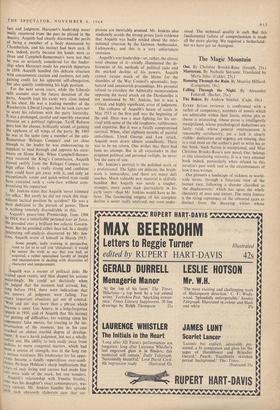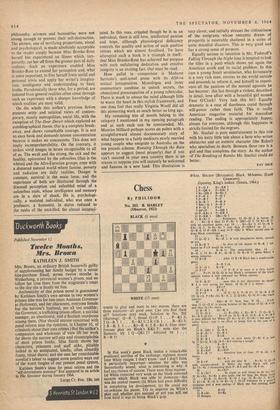The Magic Mountain
Running Through the Rain. By Maurice Hilliard. (Longmans, I8s.) Falling Through the Night. .By Alexander Fedoroff. (Barker, 21s.) The Raker. By Andrew Sinclair. (Cape, 18s.)
EVERY fiction reviewer is confronted with a surfeit of competency, numbers of novels which are admirable within their limits, whose plot or theme is interesting, whose prose is intelligently manipulated, whose psychological deductions are fairly valid, whose general entertainment is reasonably satisfactory, yet a lack is clearly visible: dedication and urgency are missing, that is a real need on the author's part to write his or her book. Such fiction is exceptional, and Miss Christine Brooke-Rose's new novel, Out, belongs to this stimulating minority. It is a very unusual book indeed, particularly when related to this novelist's past work and to the circumstances of how it was written.
Out presents a landscape of sickness in world- wide terms, through a futuristic view of the human race, following a disaster classified as 'the displacement,' which has upset the whole chemistry of man and nature. The main feature is the rising supremacy of the coloured races as distinct from the decaying whites whose
philosophy, sciences and humanities were not strong enough to prevent their self-destruction. The picture, one of terrifying proportions, visual and psychological, is made absolutely acceptable to the reader simply because Miss Brooke-Rose herself has experienced an illness which, tem- porarily, cut her off from the greater part of daily realities. Such an experience enabled Miss Brooke-Rose to extend her perception and, what is more important, to free herself from social and personal trivia and apply her writer's imagina- tion, intelligence and understanding to basic truths. Paradoxically those who, for a period, are isolated from general realities often come through such an experience with a sharper knowledge of which realities are most valid.
On the whole this author's previous fiction presents witty and satirical views of contem- porary, mostly metropolitan, social life, with the exception of The Dear Deceit which explored an autobiographical theme. Out is a complete break- away, and shows remarkable courage. It is not an easy book and demands intense concentration because it makes no concessions. This does not imply incomprehensibility. On the contrary, it strikes vivid images in terms recognisable to all of us. The weak and the strong, the sick and the healthy, epitomised by the colourless (that is the whites) and the Afro-Eurasian groups, cope with a distorted natural world where famine, poverty and radiation are daily realities. Danger is constant, survival is the main issue, and the experience of both are illustrated through the dimmed perception and enfeebled mind of a colourless male, whose intelligence and memory are in a state of shock. He is, psychologi- cally, a mutated individual, who was once a professor, a humanist, in status reduced to the ranks of the unskilled, the almost incapaci- tated. In this man, crippled though he is as an individual, there is still love, intellectual passion and hope, although physiological deficiency controls the quality and action of such positive virtues which are almost fossilised. To have attempted such a book is a triumph in itself: that Miss Brooke-Rose has achieved her purpose with such unfaltering dedication and creative integrity is an exciting fact. Out must be read.
How pallid in comparison is Madame Sarraute's anti-novel prose with its déjà-vu textual juxtaposition. Monologue and inner commentary combine to unlock secrets, the obsessional preoccupation of a young tubercular. There is much to amuse the mind although little to warm the heart in this stylish framework, and one does feel that really Virginia Woolf did all this pioneering work so much better so long ago.
My remaining trio of novels belong to the category I mentioned in my opening paragraph and as such each can be commended. Mr. Maurice Hilliard perhaps scores on points with a straightforward almost documenta0 story of what happens to a fairly mediocre newly married young couple who emigrate to Australia on the ten pounds scheme. Running Through the Rain appears to suggest (most properly) that if you can't succeed in your own country there is no reason to suppose you will instantly be welcomed and famous in a new land. This illustration is very clever, and initially stresses the ordinariness of the emigrants whose romantic dream of prosperity is miserably shattered in a series of quite dreadful disasters. This is very good and has a strong sense of purpose.
Equally serious in intention is Mr. Fedoroff's Falling Through the Night (one is tempted to link the titles in a pun) which shows yet again the American south and its racial problem. In this case a young Jesuit seminarian, who fortunately is a very rich man, returns to the world outside and proceeds to reform it, and himself to experi- ence all the passions of the sensual agnostic he has become: this last through a violent, described in detail, love affair with a beautiful girl named Four O'Clock! Very lush this bit! Equally dramatic is a case of dumbness cured through will-power rather than faith. This is really American magazine material for masculine reading. The ending is appropriately happy, almost for everyone, although this happiness is strictly limited for the negroes.
Mr. Sinclair is pure entertainment in this trio with his natty little tale about a hero who writes obituaries and an esoteric character (the Raker) who specialises in death. Between these two is a girl and that completes the story. As the author of The Breaking of Bumbo Mr. Sinclair could do better.

































 Previous page
Previous page